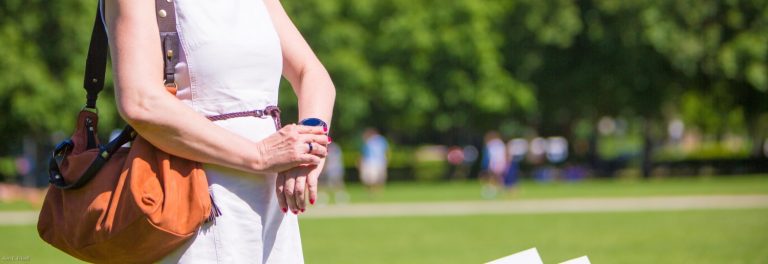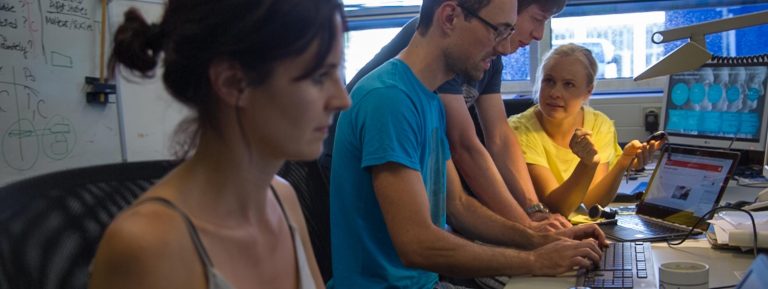Everyone is talking about digitalization – but if an older individual needs rapid (medical) care at home, they are expected to rely on a medical alert system. The technology is outdated and often considered stigmatizing – which is how the young Munich startup Qolware sees it at any rate. With its LOLA app, the company wants to make health monitoring and emergency medical care intelligent – and usher it into the digital age.
But let’s start by finding out who is actually behind the idea for Qolware. We are assured by co-founder Therese Tönnies that it is backed by a team that highly values a multidisciplinary approach. The graduate psychologist met her co-founder Christina Soaz — who is an electrical engineer by trade — six years ago. While working on their doctoral theses and taking the first steps in their careers, they gathered ideas and impressions from the field of healthcare. In 2016, they began with their undertaking to configure consumer devices such as smartphones and smartwatches to help patients with chronic conditions as well as seniors. The result: LOLA. It is a sensor-based system that aims to make health monitoring and emergency assistance intelligent. But doesn’t something like that already exist? Therese Tönnies answered:
“Actually, no: The current solutions are based on outdated technology — here the keyword is medical alert — which is considered quite stigmatizing on the one hand, and ignores the user’s actual needs on the other. For example, the systems are meant to encourage a safe and active lifestyle, but are limited to a range of approximately 30 to 60 feet. That means it is not possible to work in your yard or take a short walk in your neighborhood.”
“Sometimes we talk about digital watches instead of smartwatches”
Increased flexibility is needed! That is why Qolware’s uses smartwatches, which can also be called “digital watches.” Founder Tönnies revealed that how you talk about new technology can help make older individuals less apprehensive about using it:
“Sometimes we just call them digital watches instead of smartwatches, which makes the device seem more familiar and less intimidating to try out.”
In general, she reacts calmly to critique about whether using digital devices is realistic. From her experience, older people are willing to learn how to use communication apps to be able to keep in contact with younger generations and be a part of their lives. In her opinion, it is all a matter of motivation and the actual value of a service.
So what benefits does LOLA offer its user? With the smartwatch, physiological signals like body movement and heart rate are recorded and analyzed, as are possible deviations from daily routines. If the algorithm thinks it has detected an emergency — a fall, for example — an alarm is triggered that can also be manually overridden. It is also possible for the user to manually make an SOS call independently from the system. The system works — in contrast to a medical alert — regardless of where you are, and GPS tracking can be used in a case of emergency to even help rescue teams locate the wearer. It is also possible to use the collected data to recognize health risks early on. Additional added value for the user: LOLA can be used as a reminder and tracking tool for regularly taking medication. The data is not only interesting for the patient, but also for their family and medical caregivers.
With its approach, the Munich startup is indeed breaking new ground, which continuously presents new challenges. Recognizing movement and health patterns of individuals who are limited in their mobility and not fully healthy makes objective measurement tools necessary that go above and beyond the common standards offered by pedometers or calorie calculation. Sensor technology is needed. Tönnies sees her startup in a strong position:
“This is precisely where our development team’s exceptional background in research comes in as do our partnerships with clinics and research institutes.”
“We’re ready to put the first version of our app on the market”
How is business going?
“In the last 18 months, we received roughly 220,000 euros in public funding from BMWi Exist, EIT Health and ESA, to name a few. That made it possible for us to overcome quite a few small and large technical challenges. We also gained partners in the charity and clinical field, have strengthened our strategy and, last but not least, established a strong team. Now we are ready to put the first version of our app on the market.”
The Qolware team is no longer just the two founders, but now includes five additional employees in development, marketing, legal and finance.
Although only a few in the team are from Munich, the young startup feels at home in the Bavarian capital, because:
“Munich is obviously not Berlin, but perhaps that is why the Bavarian startup scene is so much more serious and substantial – a large number of startups are spin-offs from research institutions. They, like us, have a sound basis for introducing new approaches in the fields of healthcare, mobility and energy.”
Serious and substantial could also be used to describe Qolware’s objective, namely solid and profitable growth. And according to Tönnies’ estimation, the chances of reaching that goal are looking quite good at the moment:
“The health and care sector is sluggish, however, at this point in time where the old strategies are quite obviously unable to address the demographic trend over the long term, new solutions and business models are desperately being looked for.”





